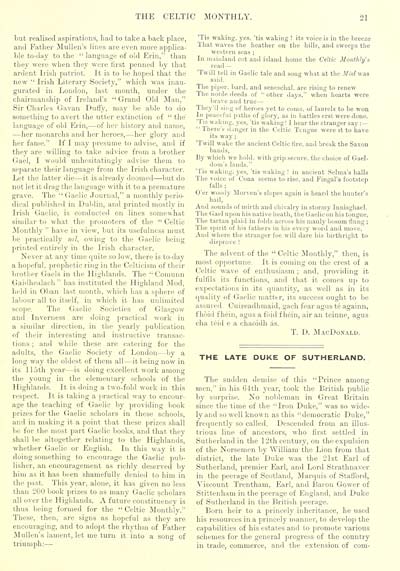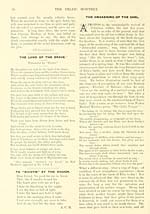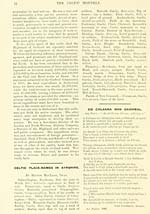Blair Collection > Celtic monthly > Volume 1, 1893
(33)
Download files
Complete book:
Individual page:
Thumbnail gallery: Grid view | List view

THE CELTIC MONTHLY.
but realised aspirations, bad to take a back place,
and Father Mullen's lines are even more applica-
ble to-day to the " language of old Erin,'' than
they wen- when they were first penned by that
ardent Irish patriot. It is to be hoped that the
new " Irish Literary Society," which was inau-
gurated in London, last month, under the
chairmanship of Ireland's " Grand Old Man,"
Sir Charles Gavan Duffy, may be able to do
something to avert the utter extinction of " the
language of old Erin, — of her history and name,
— her monarchs and her heroes, — her glory and
her fame." If I may presume to advise, and if
they are willing to take advice from a brother
Gael, I would unhesitatingly advise them to
separate their language from the Irish character.
Let the latter die — it is already doomed— but do
not let it drag the language with it to a premature
grave. The " Gaelic Journal," a monthly perio-
dical published in Dublin, and printed mostly in
Irish Gaelic, is conducted on lines somewhat
similar to what the promoters of the "Celtic
Monthly " have in view, but its usefulness must
be practically nil, owing to the Gaelic being
printed entirely in the Irish character.
Never at any time quite so low, there is to-day
a hopeful, prophetic ring in the Celticism of their
brother Gaels in the Highlands. The " Comunn
Gaidhealach " has instituted the Highland Mod,
held in Ohan last month, which has a sphere of
labour all to itself, in which it has unlimited
scope. The Gaelic Societies of Glasgow
and Inverness are doing practical work in
a similar direction, in the yearly publication
of their interesting and instructive transac-
tions ; and while these are catering for the
adults, the Gaelic Society of London — by a
long way the oldest of them all — it being now in
its 115th year — is doing excellent work among
the young in the elementary schools of the
Highlands. It is doing a two-fold work in this
respect. It is taking a practical way to encour-
age the teaching of Gaelic by providing hook
prizes for the Gaelic scholars in these schools,
and in making it a point that these prizes shall
be for the most part Gaelic books, and that they
shall be altogether relating to the Highlands,
whether Gaelic or English. In this way it is
doing something to encourage the Gaelic pub-
lisher, an encouragement as richly deserved by
him as it has been shamefully denied to him in
the past. This year, alone, it has given no less
than 200 book prizes to as many Gaelic scholars
all over the Highlands. A future constituency is
thus being formed for the "Celtic Monthly."
These, then, are signs as hopeful as they are
encouraging, and to adopt the rhythm of Father
Mullen's lament, let me turn it into a song of
triumph: —
'Tis waking, yes, 'tis waking ! its voice is in the breeze
That waves the heather on the hills, and sweeps the
\\ estera seas ;
In mainland cot and island home the Celtic Monthly's
read —
'Twill tell in Gaelic tale and song what at the Mod was
said.
The piper, bard, and seneschal, are rising to renew
The noble deeds of " other days," when hearts were
brave and true —
They'll sing of heroes yet to come, of laurels to be won
In peaceful piths of glory, as in battles erst were done,
"f is waking, yes, 'tis waking ' i hear the stranger say :—
"There's danger in the Celtic Tcngue were it to have
its way ;
'Twill wake the ancient Celtic fire, and break the Saxon
bands,
By which we hold, with grip secure, the choice of Gael-
dom's lands."
'Tis waking, yes, 'tis waking ! in ancient Selma's halls
The voice of Cona seems to rise, and Fingal's footstep
falls ;
O'er weedy Mm veil's slopes again is heard the hunter's
hail,
And si muds of mirth and chivalry in stonny Innisghael.
The Cael upon his native heath, theCaelicnn his tongue,
The tartan plaid in folds across his manly bosom flung ;
The spirit of his fathers in his every word and move,
And where the stranger foe will dare his birthright to
disprove ?
The advent of the " Celtic Monthly," then, is
most opportune. It is coining on the crest of a
Celtic wave of enthusiasm; and, providing it
fulfils its functions, and that it comes up to
expectations in its quantity, as well as in its
quality cif Gaelic matter, its success ought to be
assured Cuireadhmaid, gach fear agus te againn,
fhbid f hein, agus a foid f hein, air an teinne, agus
cha teid e a chaoidh as.
T. D. MacDonald.
THE LATE DUKE OF SUTHERLAND.
The sudden demise of this "Prince among
men," in his 64th year, took the British public
by surprise. No nobleman in Great Britain
since the time of the "Iron Duke," was so wide-
ly and so well known as this "democratic Duke,"
frequently so called. Descended from an illus-
trious line of ancestors, who first settled in
Sutherland in the 12th century, on the expulsion
of the Norsemen by William the Lion from that
district, the late Duke was the 21st Earl of
Sutherland, premier Earl, and Lord Strathnaver
in the peerage of Scotland, Marquis of Stafford,
Viscount Trentham, Earl, and Baron Gower of
Stittenham in the peerage of England, and Duke
of Sutherland in the British peerage.
Born heir to a princely inheritance, he used
his resources in a princely manner, to develop the
capabilities of his estates and to promote various
schemes for the general progress of the country
in trade, commerce, and the extension of com-
but realised aspirations, bad to take a back place,
and Father Mullen's lines are even more applica-
ble to-day to the " language of old Erin,'' than
they wen- when they were first penned by that
ardent Irish patriot. It is to be hoped that the
new " Irish Literary Society," which was inau-
gurated in London, last month, under the
chairmanship of Ireland's " Grand Old Man,"
Sir Charles Gavan Duffy, may be able to do
something to avert the utter extinction of " the
language of old Erin, — of her history and name,
— her monarchs and her heroes, — her glory and
her fame." If I may presume to advise, and if
they are willing to take advice from a brother
Gael, I would unhesitatingly advise them to
separate their language from the Irish character.
Let the latter die — it is already doomed— but do
not let it drag the language with it to a premature
grave. The " Gaelic Journal," a monthly perio-
dical published in Dublin, and printed mostly in
Irish Gaelic, is conducted on lines somewhat
similar to what the promoters of the "Celtic
Monthly " have in view, but its usefulness must
be practically nil, owing to the Gaelic being
printed entirely in the Irish character.
Never at any time quite so low, there is to-day
a hopeful, prophetic ring in the Celticism of their
brother Gaels in the Highlands. The " Comunn
Gaidhealach " has instituted the Highland Mod,
held in Ohan last month, which has a sphere of
labour all to itself, in which it has unlimited
scope. The Gaelic Societies of Glasgow
and Inverness are doing practical work in
a similar direction, in the yearly publication
of their interesting and instructive transac-
tions ; and while these are catering for the
adults, the Gaelic Society of London — by a
long way the oldest of them all — it being now in
its 115th year — is doing excellent work among
the young in the elementary schools of the
Highlands. It is doing a two-fold work in this
respect. It is taking a practical way to encour-
age the teaching of Gaelic by providing hook
prizes for the Gaelic scholars in these schools,
and in making it a point that these prizes shall
be for the most part Gaelic books, and that they
shall be altogether relating to the Highlands,
whether Gaelic or English. In this way it is
doing something to encourage the Gaelic pub-
lisher, an encouragement as richly deserved by
him as it has been shamefully denied to him in
the past. This year, alone, it has given no less
than 200 book prizes to as many Gaelic scholars
all over the Highlands. A future constituency is
thus being formed for the "Celtic Monthly."
These, then, are signs as hopeful as they are
encouraging, and to adopt the rhythm of Father
Mullen's lament, let me turn it into a song of
triumph: —
'Tis waking, yes, 'tis waking ! its voice is in the breeze
That waves the heather on the hills, and sweeps the
\\ estera seas ;
In mainland cot and island home the Celtic Monthly's
read —
'Twill tell in Gaelic tale and song what at the Mod was
said.
The piper, bard, and seneschal, are rising to renew
The noble deeds of " other days," when hearts were
brave and true —
They'll sing of heroes yet to come, of laurels to be won
In peaceful piths of glory, as in battles erst were done,
"f is waking, yes, 'tis waking ' i hear the stranger say :—
"There's danger in the Celtic Tcngue were it to have
its way ;
'Twill wake the ancient Celtic fire, and break the Saxon
bands,
By which we hold, with grip secure, the choice of Gael-
dom's lands."
'Tis waking, yes, 'tis waking ! in ancient Selma's halls
The voice of Cona seems to rise, and Fingal's footstep
falls ;
O'er weedy Mm veil's slopes again is heard the hunter's
hail,
And si muds of mirth and chivalry in stonny Innisghael.
The Cael upon his native heath, theCaelicnn his tongue,
The tartan plaid in folds across his manly bosom flung ;
The spirit of his fathers in his every word and move,
And where the stranger foe will dare his birthright to
disprove ?
The advent of the " Celtic Monthly," then, is
most opportune. It is coining on the crest of a
Celtic wave of enthusiasm; and, providing it
fulfils its functions, and that it comes up to
expectations in its quantity, as well as in its
quality cif Gaelic matter, its success ought to be
assured Cuireadhmaid, gach fear agus te againn,
fhbid f hein, agus a foid f hein, air an teinne, agus
cha teid e a chaoidh as.
T. D. MacDonald.
THE LATE DUKE OF SUTHERLAND.
The sudden demise of this "Prince among
men," in his 64th year, took the British public
by surprise. No nobleman in Great Britain
since the time of the "Iron Duke," was so wide-
ly and so well known as this "democratic Duke,"
frequently so called. Descended from an illus-
trious line of ancestors, who first settled in
Sutherland in the 12th century, on the expulsion
of the Norsemen by William the Lion from that
district, the late Duke was the 21st Earl of
Sutherland, premier Earl, and Lord Strathnaver
in the peerage of Scotland, Marquis of Stafford,
Viscount Trentham, Earl, and Baron Gower of
Stittenham in the peerage of England, and Duke
of Sutherland in the British peerage.
Born heir to a princely inheritance, he used
his resources in a princely manner, to develop the
capabilities of his estates and to promote various
schemes for the general progress of the country
in trade, commerce, and the extension of com-
Set display mode to: Large image | Transcription
Images and transcriptions on this page, including medium image downloads, may be used under the Creative Commons Attribution 4.0 International Licence unless otherwise stated. ![]()
| Early Gaelic Book Collections > Blair Collection > Celtic monthly > Volume 1, 1893 > (33) |
|---|
| Permanent URL | https://digital.nls.uk/75841750 |
|---|
| Description | Vol. I. |
|---|---|
| Shelfmark | Blair.54 |
| Attribution and copyright: |
|
| Description | A selection of books from a collection of more than 500 titles, mostly on religious and literary topics. Also includes some material dealing with other Celtic languages and societies. Collection created towards the end of the 19th century by Lady Evelyn Stewart Murray. |
|---|
| Description | Selected items from five 'Special and Named Printed Collections'. Includes books in Gaelic and other Celtic languages, works about the Gaels, their languages, literature, culture and history. |
|---|

